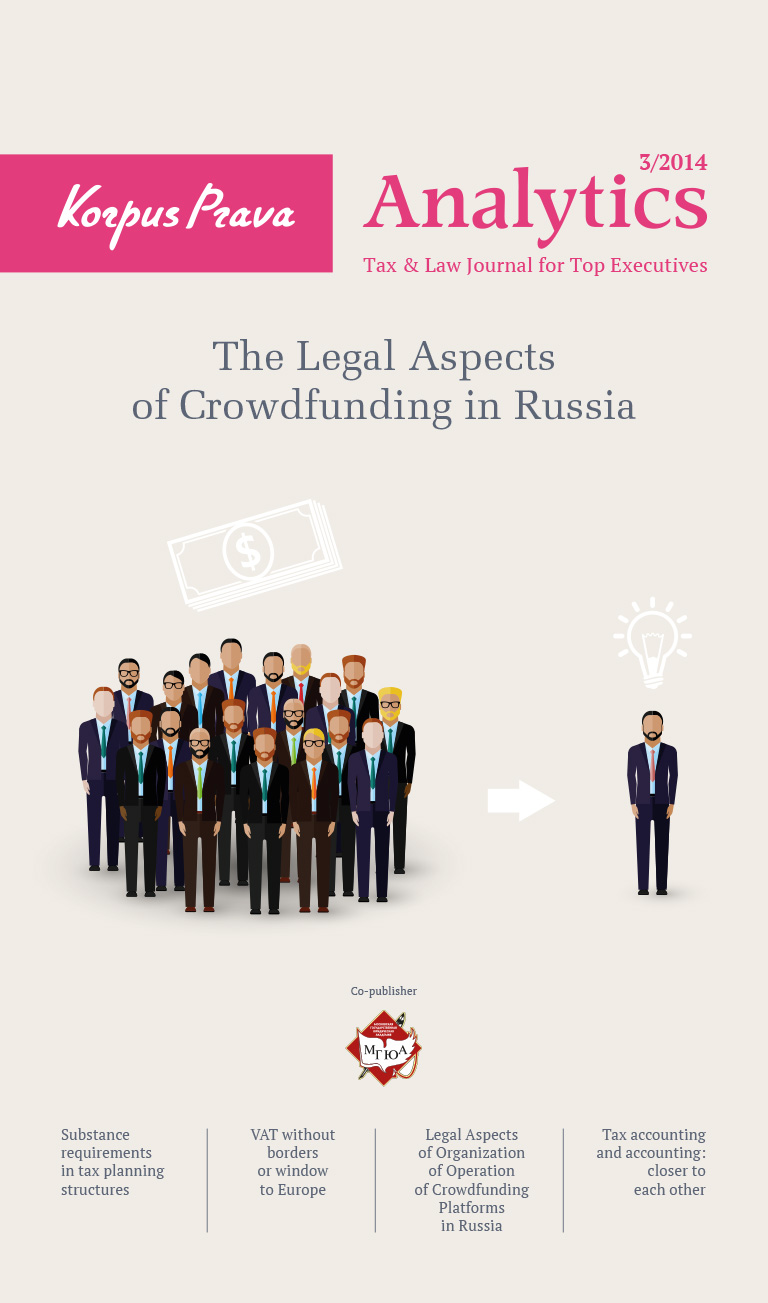- Cyprus Citizenship Scheme for Foreign Investors
- Squeezed But Pleased: Taxation of Passive Income in the European Union
- VAT Without Borders or Window to Europe
- Legal Aspects of Organization of Operation of Crowdfunding Platforms in Russia
- Substance Requirements in Tax Planning Structures
- “Deposit Splitting” of Individuals. Legal Civil and Criminal Aspects
Big Brother Chronicles: Peculiarities of Doing Business in the “Digital Age” of Taxation
One of the most discussed topics throughout 2018 was active implementation of a risk-based approach among tax authorities. It seems that anyone who directly or indirectly faces any tax liabilities was able to experience it. Moreover, last year the digitalization of the economy touched even those who had nothing to do with the issue. This article covers the highlights of 2018 associated with the advent of the “digital era” of taxation.
Electronic information resources for taxpayers
In 2015, the Federal Tax Service of Russia refused to grant monopoly powers to collect and process tax and statistical information to Interfax news agency, and various resources flooded the market of information reference systems trying to compete with the giant. And although none of the competitors has achieved any significant success in the total volume of the services rendered, smaller companies have shown themselves capable of solving certain tasks to the highest standard, such as providing information for court cases, enforcement proceedings, tax liabilities, etc.
In fact, all information bases available to taxpayers are renewed from the same sources. In turn, existing databases allow to conduct full compliance and learn about the bona fide of the counterparty, detect the interdependence of organizations with other organizations or individuals, assess financial risks when working with the counterparty.
On the one hand, such free access to information about contractors gives taxpayers an opportunity to ensure their own safety and protect themselves from mala fide contractors, but on the other hand, it causes the verification by such databases to become an essential part of the pre-contractual work. Moreover, judging from the experience, the taxpayer may be deemed to have failed to exercise due diligence, even if the counterparty has acquired signs of mala fide after entering into the agreement therewith, but the taxpayer still continued to pay or deliver to such counterparty.
Nowadays, the minimum check of the counterparty includes not only and not so much a request for copies of constituent documents from the counterparty, but the search for information about it using all available databases. First of all, it is reasonable to assess whether the counterparty’s sole executive body is “mass” or not, whether the counterparty is registered at an incorrect address or at a mass registration address, whether it has interdependent persons with significant tax debts or the ones that have been excluded from the Unified State Register of Legal Entities. In addition, it is reasonable to assess the financial performance of the organization, i.e. the ratio of income and expenses, the amount of net assets, as well as their dynamics, if available. It is worth paying attention to the incorporation date of the organization: if the organization is new, it is worth wondering why the counterparty started working through a new organization. A significantly low number of the counterparty’s employees that are unable to fulfill the obligations assumed by the counterparty is also a reason to become alerted.
It has become mandatory to keep the profile of your own organization up to par. If the questions above may be readdressed, the attitude of contractors is highly likely to be affected.
From the moment of its emergence in the market to the present day, information databases available to a wide range of taxpayers have turned the assessment of the counterparty’s mala fide risks from a nice addition to an obligatory compliance point. Currently, most large and medium-sized companies practice studying the counterparty’s profile and making decisions based thereupon.
Databases of tax authorities as an information source for tax audits
Nowadays, tax authorities are equipped not only with databases available to taxpayers, but also with information resources developed by the government, which allow to conduct automated analysis for the implementation of a risk-based approach. Software and information bases of the Federal Tax Service of Russia and other state bodies, including the Pension Fund and the Social Insurance Fund, the Federal Customs Service and the Ministry of Internal Affairs of Russia, are available to tax inspectors and allow to detect possible violations of the tax legislation by any taxpayer.
It means that when inspectors get ready for the audit, they already have the information about the persons with which the taxpayer has made any transactions, whether there are organizations among them with former and current taxpayer’s employees currently employed, and information about the organizations showing signs of mala fide among the taxpayer’s counterparties. Any action of the taxpayer bearing signs of being undertaken to obtain unjustified tax benefits is already known to the tax authority at the time of the audit.
Tax planning in modern Russia has long ceased to mean deliberate tax evasion. It has come to a state when every bona fide taxpayer should assess in advance and take into account the rational component of each transaction and be ready to explain the specific purpose and reasons for each business transaction. Business transactions should not only meet formal requirements for their registration, but also have reasonable actual justification. Therefore, the objective of tax planning now is the development of cost-effective solutions, where potential tax savings have minimal value compared to other benefits. Reasonability has become the main word in the unofficial tax dictionary of 2018.
Voluntary disclosure of tax information and self-defense against tax “gaps”
Russian tax authorities have long had a technical and legal opportunity to provide all interested parties with the information on problems with the confirmation of the right to VAT refund. At the end of 2016, the Federal Tax Service of Russia even approved a special form, which any taxpayer may use to provide a free access to its tax information1. At the time, the logical question was: What are the chances that organizations on their own initiative will give up their right to tax secrets and expose their own problems. However, as one may expect, this dubious action was not accidental. The first “call” came from the agro-industrial field.
Non-profit organizations uniting companies of the agro-industrial complex2 gained the support of the Federal Antimonopoly Service and the Public Chamber, and in October 2018, they issued a declaratory instrument – the Charter of AIC in the sphere of agricultural products turnover3. Here are some quotes for the reader to get an idea about the document:
- Participants of the agricultural products turnover draw benefits when everyone carries the tax burden in a bona fide manner according to the legislation of the Russian Federation … so that all market participants develop intolerance against tax evading companies;
- Methods of illegal tax optimization are a manifestation of unfair competition and should be condemned by market participants;
- [Charter members] seek to purchase agricultural products directly from agricultural producers, processors, or commission firms, as well as from other bona fide market participants.
The Charter not only declares principles of a careful approach to the choice of counterparties sharing its principles of bona fide tax payments and refusal to use “schemes” to save VAT, but its signing also serves another, much more significant purpose. The Charter initiates the formation of the so-called “Information resource for open sharing of information with market participants about persons that have signs of an incomplete source of tax benefits in the form of VAT deductions according to the Automated Control System VAT-2”4.
That is why the form of consent to the disclosure of tax information was introduced! By voluntarily joining the formation of the Information Resource Charter members not only provide access to their tax information themselves, but offer and, to the best of their abilities, enable counterparties to do the same. Coordinated actions of market participants resulted in a significant part of AIC already forming the Information Resource. According to incoming data, inspections of the Federal Tax Service of Russia are also actively involved in the promotion of the Information Resource.
Despite the fact that at first glance the Information Resource seems to serve a good purpose and allow to quickly monitor, whether the taxpayer has a confirmed VAT source, participation in its formation does not look safe. Charter member organizations already include disclosure provisions in agreements with counterparties, and some of them are ready to withdraw from entering into an agreement with the counterparty on the grounds that the latter is not ready to join the formation of the Information Resource. Pursuant to the antimonopoly legislation, such behavior may indicate that companies in the industry enter into competition limiting agreements.
In addition, neither on the website of the Charter, nor in any other sources one is able to find the proof that the information included in the Information Resource is sufficiently protected and cannot get into the hands of intruders. One more questionable issue is whether the disclosure of tax information by one taxpayer (bona fide by default as he/she has provided access to his/her tax information) will allow to identify mala fide counterparties, if the counterparty has more than one business activity, and therefore, may have completely different and unrelated sources of tax base formation.
Finally, financial risk indices and debts, including debts on taxes, are available in other much more advanced sources. Previously mentioned information databases provide sufficient data to draw conclusions on the bona fide or mala fide of organizations.
Following objective assessment of the Information Resource development on the basis of the Charter, it is impossible not to draw attention to the fact that purposes of its existence limit competition rather than protect the Charter members. Despite this, with the support and (possibly) driven by the will of a number of quasi-state entities, representatives of other economic sectors will follow the example of AIC and will also start collecting information and forming their own information resources. As a result, the amount of information disclosed by each individual taxpayer may exceed all reasonable limits, and very soon we will have to forget about the tax secrecy regime stipulated by the law.
- Order of the Federal Tax Service of Russia No. ММV-7-17/615 dated 15.11.2016.
- Hereinafter the term “agro-industrial complex” shall be abbreviated to “AIC”.
- The text of the Charter is available on the special website: https://xn—-7sbb4am3adqy8h.xn--p1ai/o-hartii
- More information on the resource functioning is available on the Charter website: https://xn—-7sbb4am3adqy8h.xn--p1ai/nalogovye-razryvy.
Your subscription to our journal will definitely boost the efficiency of your specialists and downsize your expenses for consultants.
The journal is available free of charge in the electronic version.
Free Download

